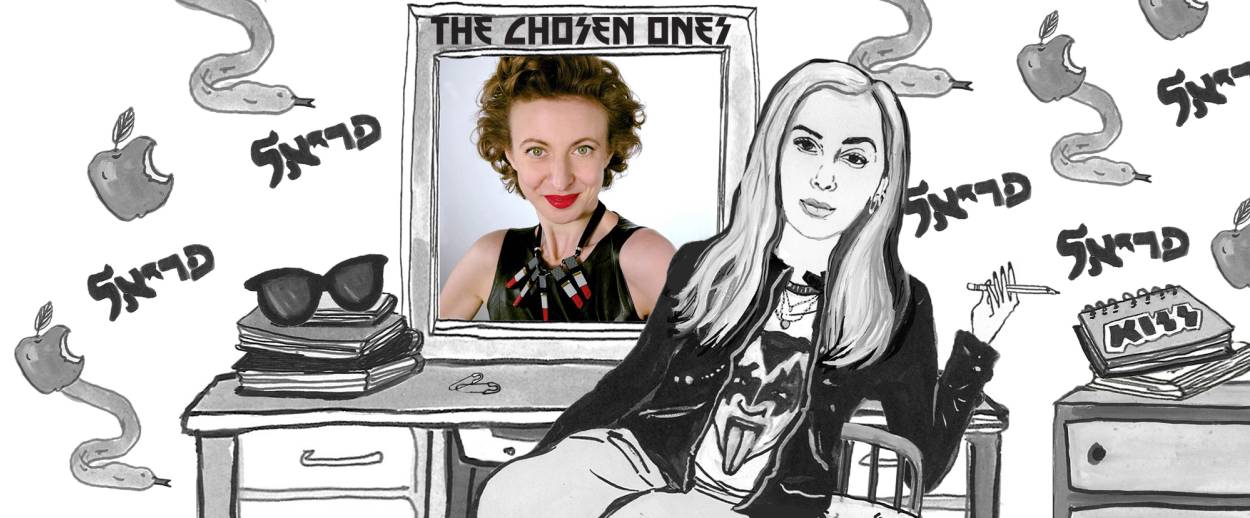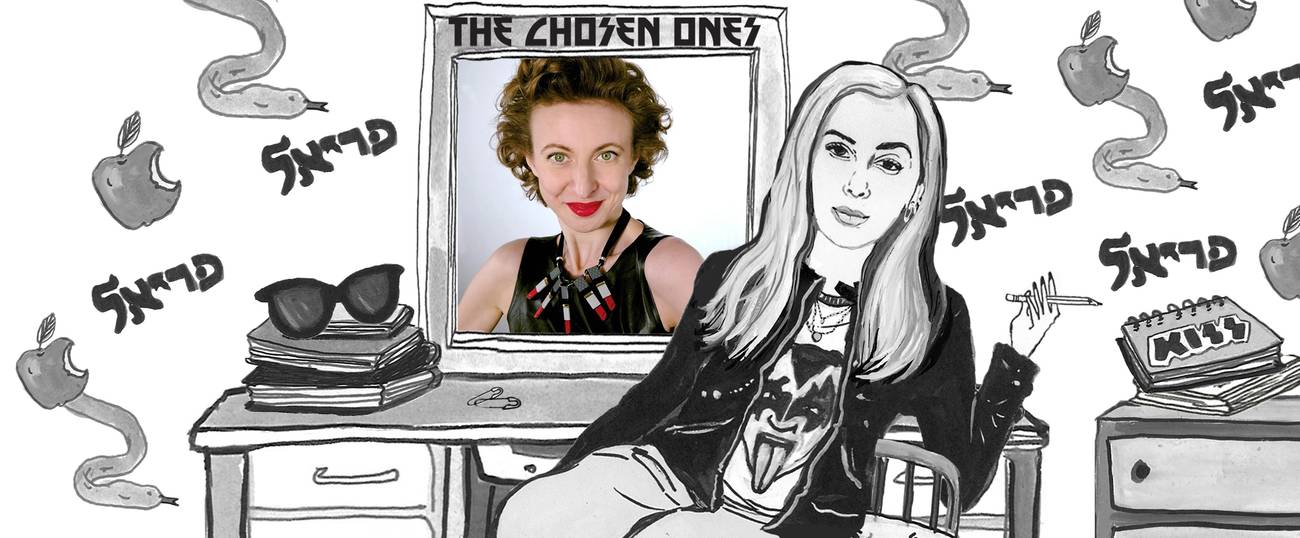The Chosen Ones: An Interview With Poppy King
The Australian cosmetics entrepreneur talks with us about letting her hair ‘go Jewish,’ a plastic surgeon’s office on the Upper East Side, and challenging the standards of the beauty industry




The Chosen Ones is a weekly column by author and comedian Periel Aschenbrand, who interviews Jews doing fabulous things.
This King is a queen. A lipstick queen, that is.
Unlike monarchs who do nothing except be born, a person must work one’s royal ass off in order to become a Lipstick Queen.
Poppy King, for her part, started laboring when she was 18 years old. I don’t generally like recapping things you can find on the internet, but for those of you just tuning in, King, in the early 1990s, created her eponymous line, Poppy, when she was fresh out of high school. Shortly after, she signed a deal with Barneys and spent the next 10 years coming to New York from Melbourne four to five times a year. By 1995, she was running a multimillion-dollar company, was heralded “Young Australian of the Year,” and named “Global Leader for the New Millennium” by Time.
King was then lured (that’s my word; hers is “recruited”) to the United States for good by Estée Lauder, where she served as color designer, creative marketer, and trend forecaster for one of their companies. (You’re not the only one who thinks those job titles sound made up, like complete and utter nonsense.) King lasted about three years there—discovering, as she put it, “The corporate world wasn’t for me.”
What was for her, apparently, was being a creative genius: She consistently tops herself, having recently created top-selling lipstick Frog Prince—a green lipstick that turns pink—while landing a weekly spot on QVC. More than 20 years after she created Poppy, she now represents Lipstick Queen, which she founded and created.
Listening to Poppy makes you feel like fairy tales can come true, especially for Jewish Princesses. “Look,” she said, “I know: Get on QVC, where everyone is talking about fake tans and straightening their hair and nude lips—and I do none of that. I know I’m an acquired taste. For starters, I’m the only one in the beauty industry who has such a Semitic profile. I have two major hallmarks of being Jewish—a large nose and curly hair—both of which are aspects of my physicality I’ve had to learn to embrace. Part of why I went into this industry was to challenge the standard of beauty, because I didn’t fit the mold of conventional WASP-y beauty.
“Looking the way I do, I really only had two choices. One was to go really punk and angry and aggressive, but my way of protesting was to become hyperglamorous. Beauty is strict, but glamour is much more open and democratic. As a Jewish woman, there is a real flair for glamour and my approach is very spirited. And it’s been interesting to see the way so many mainstream women have responded to this. By the way, wearing my hair naturally curly and letting it ‘go Jewish’ has been one of the most liberating things for me. For a long time, I was afraid to look at comments online about my looks and my nose. I was scared of what the comments from Middle America would be. An ex-boyfriend of mine finally convinced me to read them, and while most of them did bring up my nose, it was in a complimentary way. Like, ‘So refreshing to see she hasn’t had her nose done.’ The truth is, the general population is much more open-minded about beauty than the beauty industry is. Men set standards in the beauty industry for reasons of capitalism. Capitalism relies on a lot of unpaid labor by women—if women weren’t doing all that unpaid labor in the home, men wouldn’t be able to do what they do.”
OK, enough with the feminism. Talk to me more about your nose.
Well …
OK, talk to me about being an Australian Jew first and then we’ll transition into your nose.
People don’t really associate Jews with Australia.
That’s right. We associate Vegemite and koala bears.
It is an anomaly. Being Jewish is something that goes on behind closed doors. Australia is very WASP-y.
How did your family wind up there?
My great-grandparents moved there from Poland well before the war, in the 1920s.
Did you have a bat mitzvah?
No, because my mother, who is a Cohen, hates all religion. So I was not allowed to have a bat mitzvah, which upset my grandparents. We used to go there for all holidays. They were kosher.
So you identify as Jewish?
Oh, yes! I’m riddled with guilt, I overanalyze everything, and I make everything much more complicated than it needs to be. I’m totally Jewish.
OK, now can you tell me about your nose?
The struggle with my nose was not only an aesthetic one. When I was growing up, all the witches in the fairy tales I read had big noses, which really upset me as a little girl. I had this feature that was not only unattractive, but was also associated with evil.
Oh my God! That’s awful—you can totally launch into another feminist diatribe right now.
I could, actually. And I might. So I have this nose, and every day you’re exposed to beauty norms that are the opposite of what you are. So finally, I decided I was going to see about having my nose done.
Where’d you go?
To the Upper East Side, of course.
What’s that Dorothy Parker quote…?
It’s what she said to Fanny Brice after she had a nose job, that she cut off her nose to spite her race.
Yeah, exactly. OK. Go on.
So they can show you, digitally, what you would look like after a nose job and I was assuming I was going to look suddenly very conventionally beautiful—and I didn’t. I just looked … normal. More plain. I walked into this office and was greeted by a fembot and everyone who works in the plastic surgeon’s office has had, like, a ton of work done, and there is this altered-universe feeling. This woman who had been sent to cajole me said to me, “Listen, you’re attractive now, but after you’re going actually be beautiful.”
That enraged me. She showed me this whole book of women who had had rhinoplasty and they all, in large part, went from looking unique to looking, well, more normal. And I realized that this was about normalizing yourself, not beautifying yourself, and that being unique is challenging and that’s what’s interesting. By the time the doctor arrived, I was appalled and it was just sport, to talk to him. It was all manipulation and propaganda. And to add insult to injury, he suggested that in addition to rhinoplasty, I would also benefit from getting a chin implant! Even I, in my most paranoid moments, know there is nothing wrong with my chin. And they wouldn’t let me leave without making a follow-up appointment.
I’m not going to let you leave me without making a follow-up appointment with me, either.
I don’t mind making one with you.
I’m flattered. What’s your favorite drink?
Rosé.
How do you eat your eggs?
Soft-boiled. With soldiers.
Coffee?
Almond-milk latte.
That’s tedious. What’s your favorite Jewish Holiday?
I don’t have a favorite Jewish holiday, but I love Jewish weddings!
What shampoo do you use?
I don’t. I only use conditioner. My hair never gets oily and if you have really curly hair you shouldn’t shampoo! I have hair like wire, you can actually bend it.
More proof you’re Jewish. Gefilte fish or lox?
Both!
Favorite film?
Bob Fosse’s Cabaret.
Five things in your bag right now?
Phone, wallet, notebook, a pen, and a tube of red lipstick.
What’s your favorite pair of shoes?
That’s like Sophie’s Choice! Every pair I own, which is over 200.
Periel Aschenbrand, a comedian at heart, is the author of On My Kneesand The Only Bush I Trust Is My Own.